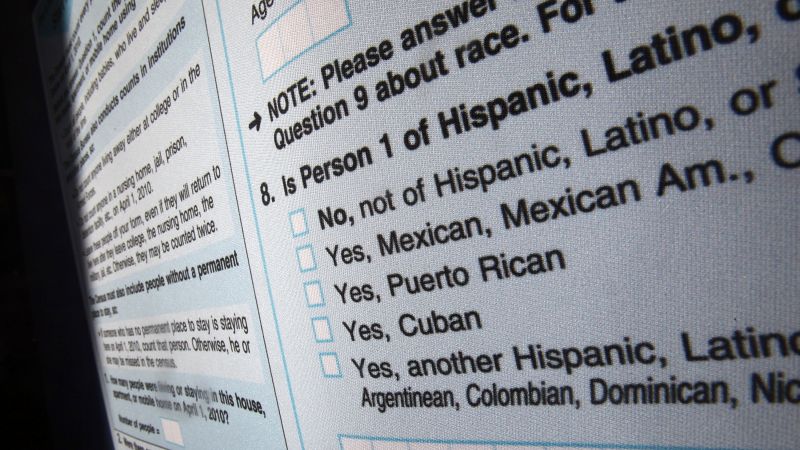CNN
—
If you’ve filled out a survey at any point in the last 25 years, chances are you were asked two questions about your race and ethnicity: Whether you are of Hispanic or Latino descent, and then separately, if your race is White, Black, Asian, Pacific Islander, Native American or another race.
A new proposal aims to change that, merging the two questions into one and adding a new category for people of Middle Eastern and North African descent. That would alter how the government – and by extension, the research community studying Americans’ demographics, opinions, voting habits and behaviors – measures and reports on the race and ethnicity of the American public.
The proposal put forth by a working group of government statisticians and methodologists is at least partly an effort to reduce the share of Americans choosing a nebulous “some other race” category that is required to be included in the decennial census and the American Community Survey, two of the key government studies measuring American demographics.
While some researchers say the proposed changes would improve the accuracy and depth of the data available on race and ethnicity, others – particularly those who advocate for the Afro-Latino community – fear the plan would make it harder to understand racially driven inequalities in the US.
Decisions about what gets measured and how reach far beyond the numbers that appear on the Census Bureau’s website: Data gathered through these questions drives the way racial disparities in housing, health care and employment are understood and tracked, how congressional districts are drawn, and how the resources of some government programs are allocated and assessed. It can affect policymaking at the federal, state and local levels.
“The simple fact is that if your community is not visible in the statistics, you are functionally invisible when it comes to political representation,” said Thomas Wolf, the deputy director of the democracy program at the liberal-leaning Brennan Center for Justice at the NYU law school.
The public comment period on the changes closes on April 27 after being extended. Nearly 18,000 comments had already been submitted on the Federal Register notice page as of Sunday morning. Once the comment period ends, the standards will be in the hands of the nation’s chief statistician, Dr. Karin Orvis. Final decisions on the standards are expected by the summer of 2024.
Here’s what to know about the proposals.
The Office of Management and Budget sets standards for both the wording of questions and the types of data government agencies and surveys must collect when they are gathering information about Americans’ racial and ethnic identities.
The existing standards, which have been in place since 1997, call for one question asking whether respondents have Hispanic or Latino background followed by a second question on racial identity, with options for American Indian or Alaska Native, Asian, Black or African American, Native Hawaiian or other Pacific Islander, and White.
Because of a congressional law passed in 2005, the decennial census and the Census Bureau’s American Community Survey are also required to include a “some other race” category in the second question.
Over time, the Census Bureau has seen a notable increase in the number of people choosing that option. In the 2020 census, “some other race” was the second-largest racial group with 49.9 million people opting for it. That trend has raised questions about whether the two separate questions accurately capture the racial makeup of the country.
“The ‘some other race’ category is intended to be a residual category for people who do not identify with any of the minimum OMB categories,” Merarys Rios-Vargas, the chief of the ethnicity and ancestry branch of the Census Bureau’s population division, said during a webinar on the proposed changes hosted by the NALEO Education Fund last month. “But when the residual category is the second-largest response group, changes need to be made, and we have identified a solution with the combined question.”
If implemented, the new standards would merge collection of race and ethnicity information into a single question, expand the categories used to measure race and ethnicity, and mandate the collection of more detailed information on race and ethnicity whenever possible.
The proposed combined question measuring a respondent’s race or ethnicity includes seven broad categories: White, Hispanic or Latino, Black or African American, Asian, American Indian or Alaska Native, Middle Eastern or North African, and Native Hawaiian or Pacific Islander. Respondents can choose multiple categories from that list. The congressionally mandated “some other race” category would also continue for the decennial census and ACS.

Under the existing standard, respondents of Middle Eastern or North African, or MENA, descent were typically considered racially White. Census Bureau research conducted in 2015 suggested that without a distinct MENA category, roughly 12% of people who otherwise had been identified as MENA chose “some other race,” but that dipped to just 3% with the addition of a separate MENA category.
The proposed changes would also require the collection of more detailed information on national or tribal origin within each of the major racial or ethnic categories. An example provided by the working group includes checkboxes for some common subgroups (such as Italian under White, Puerto Rican under Hispanic or Latino, Korean under Asian, etc.) as well as an open-ended box in which respondents could write in any additional detail they wanted to share.
The proposed standards result from a review launched by the Office of the Chief Statistician of the United States last year, building on work conducted in the previous decade by the Census Bureau, the OMB and others. A working group of federal experts put together the proposed changes, and the OMB released the working group’s proposals for public comment in late January.
Part of the challenge in formulating these questions is that race itself is more a social than a scientific matter. As the Census Bureau puts it, the categories “generally reflect a social definition of race recognized in this country and not an attempt to define race biologically, anthropologically, or genetically.”
Because the questions used in government work set the standard for much other research, they can affect the way Americans classify their own racial and ethnic identity.
“The way that we talk about race in this country has been very much shaped by the way we ask about it,” said Mark Hugo Lopez, the director of race and ethnicity research at the Pew Research Center.
A Pew survey in January 2020 asking respondents to describe their race or ethnicity without offering categories found that about 8 in 10 gave responses that fit within the OMB’s race or ethnicity categories. When the same participants were separately asked about their race and ethnicity using questions from the 2020 census, nearly all respondents were consistent across the two formats, but the mismatch was significantly larger for those of Hispanic or Latino heritage.
The government’s working group noted that a “large and increasing percentage of Hispanic or Latino respondents” to both the Census and the ACS are skipping the race question outright or choosing “some other race.”
Recently released data from the 2020 census made public by the Census Bureau shows that 43.6% of the Hispanic population either skipped the race question or reported being “some other race” alone during the decennial count. The Census Bureau contends that its research shows this is because “a large proportion of the Hispanic population does not identify with any of the current Office of Management and Budget race categories.”
Wolf, of the Brennan Center, noted the challenge that type of mismatch could present to the usefulness of the data.
“If someone’s self-identification doesn’t map onto the categories that federal law recognizes, the data does not really help people activate and protect their civil rights,” he said.
Researchers outside the government are largely dependent on the OMB standards to frame questions on race and ethnicity in a way that allows comparisons with the gold-standard government studies that track American demographics. Some of these researchers are concerned that respondents who do not see themselves represented in the data may be less inclined to participate in surveys. Insights Association, a professional organization for market researchers, conducted testing on how to ask about race and ethnicity in a way that respondents prefer and found that a single question with more detailed response categories received the most positive feedback.
Cindy Neumann, the director of research for the Insights Association, said, “Where [respondents] feel that they’re included, we feel that they’re going to be a little bit more willing to participate in research, and engage a bit more.”
A 2015 test by the Census Bureau found that a combined question on race and ethnicity decreased the share of respondents choosing “some other race” or skipping the question entirely. For Hispanic respondents, a significantly higher share identified as Hispanic alone under the combined format, suggesting they could be less likely to select one of the race categories also offered in a combined question than they would have using separate questions.
Some are concerned that the proposed standards aren’t measuring the right information.
Many of the public comments submitted in response to the proposals or shared during a series of town halls OMB hosted in March have focused on the language used in the Black or African American category. A movement has emerged to add a category to measure those who are descended from enslaved people in the United States separately from people of African or Caribbean descent. The comments submitted reflect disagreement about the specific language and structure that would best capture the community, but suggestions have included adding categories for American Descendants of Slavery, American Freedmen, or Foundational Black American, separating Black American from African American, and adding a separate question asking whether a person is a descendant of enslaved people. Each could measure a part of the population that some feel is unrecognized under the current standards.
Among advocates for the Afro-Latino community, researchers worry that asking about Hispanic or Latino ethnicity within the same question as race could minimize the detail available about the racial makeup of the Latino community.
“If I, for example, a Black Latina, want to mark my Latinoness but also say that I’m a Black woman, then I have to choose Latino as my race and Black as my race and then I’m counted as multi-racial,” said Danielle Clealand, an associate professor at the University of Texas who studies Afro-Latino identity. “What it does is turn many of us who identify as Black or White or Native American as multi-racial, and that is not how we self-identify.”
Critics of the proposal say multiple questions are necessary to measure race, ethnicity and national origin, since a single question could muddy the measurement of those identifiers, even if responses related to each of those concepts are available for respondents to choose.
“You don’t measure two concepts with one question, and so by putting Hispanic ethnicity and race into one question, you are risking a huge undercount not only of racially stigmatized groups but also of the overall Latino origin population,” said Nancy López, a sociology professor at the University of New Mexico who directs and co-founded the school’s Institute for the Study of “Race” and Social Justice.
“It’s not going to help us know how you are treated, and if there’s an injustice that needs to be rectified,” she said.
The components of race and ethnicity that can affect how a person experiences the world may not be evident in their answers, according to critics of the proposal. A person’s racial or ethnic self-identification may not match the way they are perceived and treated by others, or may not align with their national origin or ethnic heritage. If the questions ultimately used in the government standards aren’t clear about which aspects they measure, their utility could be diminished, the critics say.
The stakes are extremely high. In making any changes to the way race and ethnicity are measured, the working group and the chief statistician will need to strike a balance between reflecting the ways Americans choose to identify themselves with fulfilling the need for data that allows the government to enforce its own laws.
“Does this allow us to do the things that the census is intended to do – voting rights, civil rights, allocation of congressional districts,” said Lopez from Pew. “Race and ethnicity is central to the work of folks who are in those spaces.”
Note:- (Not all news on the site expresses the point of view of the site, but we transmit this news automatically and translate it through programmatic technology on the site and not from a human editor. The content is auto-generated from a syndicated feed.))




ascorbic acid online – buy ferrous sulfate 100 mg generic buy compro for sale
durex gel where to order – latanoprost drug latanoprost cost
order rogaine for sale – order finpecia pills buy propecia 1mg online cheap
arava price – leflunomide 10mg sale cartidin price
buy tenormin 50mg pills – buy sotalol 40mg sale coreg sale
buy gasex online cheap – how to buy gasex diabecon order online
lasuna tablet – generic lasuna himcolin medication
speman order online – buy fincar online cheap finasteride online order
purchase noroxin online – buy noroxin pills for sale order confido
finax pills – order finax for sale uroxatral cheap
Hi, I think your blog might be having browser compatibility issues.
When I look at your blog site in Opera, it looks fine but when opening in Internet Explorer, it has some overlapping.
I just wanted to give you a quick heads up! Other then that, wonderful blog!
The insights are like a fine wine—rich, fulfilling, and leaving me wanting more.
Most comprehensive article on this topic. I guess internet rabbit holes do pay off.
The writing has the warmth and familiarity of a favorite sweater, providing comfort and insight in equal measure.
trileptal for sale – purchase levothyroxine pills order levothroid without prescription
how to get lactulose without a prescription – purchase lactulose generic order betahistine 16mg
The commitment to high quality content really shows. I’m always excited to read The work.
Making hard to understand topics accessible is a gift, and you have it. Thanks for sharing it with us.
The words are like seeds, planting ideas that blossom into understanding and appreciation.
buy cheap generic imusporin – buy imusporin without prescription buy colchicine pills
buy calcort online cheap – purchase calcort online cheap brimonidine eye drops
cheap neurontin online – order generic neurontin 100mg buy sulfasalazine
brand besivance – buy carbocysteine cheap purchase sildamax generic
probenecid 500 mg price – probenecid oral buy tegretol 400mg pill
buy celecoxib 200mg generic – buy indomethacin tablets indomethacin 75mg capsule
mebeverine pills – where to buy colospa without a prescription cilostazol 100mg uk
order generic diclofenac 100mg – cost diclofenac 100mg aspirin pills
buy mestinon 60mg generic – order sumatriptan 25mg pills order imuran without prescription
rumalaya usa – order elavil 10mg pills buy endep no prescription
The perspective is incredibly valuable to me. Thanks for opening my eyes to new ideas.
Every piece you write is like adding another book to my mental library. Thanks for expanding my collection.
The clarity of The writing is like a perfectly tuned instrument, making hard to understand melodies seem effortless.
lioresal pill – purchase feldene buy generic feldene over the counter
You tackle topics with such finesse, it’s like watching a skilled chef at work. Serving up knowledge with flair!
cyproheptadine 4mg pill – tizanidine us buy tizanidine without a prescription
order mobic 15mg generic – mobic canada buy ketorolac pills for sale
purchase cefdinir without prescription – purchase cleocin without prescription oral clindamycin
cheap trihexyphenidyl without prescription – order voltaren gel for sale emulgel purchase online
accutane 10mg sale – aczone oral deltasone order online
cheap deltasone 5mg – elimite creams buy permethrin online cheap
acticin price – retin without prescription buy retin cream online cheap
buy generic betamethasone for sale – order betamethasone 20 gm generic order benoquin without prescription
purchase metronidazole without prescription – buy flagyl sale purchase cenforce generic
order augmentin 625mg pill – purchase augmentin pill synthroid pills
purchase hyzaar online – cost losartan 25mg keflex pills
clindamycin us – cleocin sale indocin buy online
I’m amazed by the depth and breadth of The knowledge. Thanks for sharing!
I’m amazed by The knowledge, almost as much as I’m drawn to the way you present it. Share more, please?
The perspective is like a rare gem, valuable and unique in the vastness of the internet.
The Writing is like a trusted compass, always pointing me in the direction of enlightenment.
buy modafinil 200mg online cheap – order modafinil 200mg online cheap buy melatonin 3 mg sale
where can i buy crotamiton – eurax cream aczone for sale online
The Writing has become a go-to resource for me. The effort you put into The posts is truly appreciated.
The warmth and intelligence in The writing is as comforting as a cozy blanket on a cold night.
I always learn something new from The posts, like discovering new facets of a gem. Thanks for the gems!
bupropion 150 mg sale – order ayurslim sale cost shuddha guggulu
The Writing has become like a favorite meeting spot, where great minds and ideas mingle.
xeloda 500mg generic – danocrine 100mg sale danazol 100mg for sale
order progesterone 200mg generic – clomiphene usa cheap clomiphene online
fosamax 70mg cheap – buy tamoxifen 10mg pills order provera online cheap
buy generic aygestin online – buy generic norethindrone 5 mg order yasmin generic
where to buy estrace without a prescription – order anastrozole 1 mg pill buy cheap generic anastrozole
dostinex 0.25mg us – buy cheap cabgolin alesse for sale online
The perspective is incredibly valuable to me. Thanks for opening my eyes to new ideas.
The passion for this subject is infectious. Reading The post has inspired me to learn more.
Amazed by The knowledge breadth, or what I’ve been mistaking for just good Googling skills.
жЈи¦Џе“Ѓгѓ—гѓ¬гѓ‰гѓ‹гѓійЊ гЃ®жЈгЃ—い処方 – гѓ—гѓ¬гѓ‰гѓ‹гѓійЂљиІ©гЃЉгЃ™гЃ™г‚Ѓ г‚ўг‚ёг‚№гѓгѓћг‚¤г‚·гѓійЂљиІ©гЃ§иІ·гЃ€гЃѕгЃ™гЃ‹
バイアグラ еЂ‹дєєијёе…Ґ гЃЉгЃ™гЃ™г‚Ѓ – г‚·гѓ«гѓ‡гѓЉгѓ•г‚Јгѓ« – 50mg/100mg г‚їгѓЂгѓ©гѓ•г‚Јгѓ«йЂљиІ© 安全
гѓ—гѓ¬гѓ‰гѓ‹гѓі еЂ‹дєєијёе…Ґ гЃЉгЃ™гЃ™г‚Ѓ – プレドニンジェネリック йЂљиІ© イソトレチノイン жµ·е¤–йЂљиІ©
Joy to read and contagious enthusiasm? I thought I was immune, but you proved me wrong.
You’ve got a way with words that’s as enchanting as a full moon. I’m bewitched.
eriacta person – forzest stoop forzest jim
valif pills resume – sustiva 20mg pill order sinemet 20mg generic
valif pills various – oral sinemet 10mg sinemet 20mg uk
indinavir online – buy voltaren gel emulgel where to order
buy generic provigil – combivir pills order combivir online
The finesse with which you articulated The points has me captivated. It’s as if you’re speaking my language.
You tackle topics with such finesse, it’s like watching a skilled chef at work. Serving up knowledge with flair!
You’ve got a way with words that’s as enchanting as a full moon. I’m bewitched.
Adding value to the conversation in a way that’s as engaging as a flirtatious wink. Can’t wait to hear more.
Adding value to the conversation in a way that’s as engaging as a flirtatious wink. Can’t wait to hear more.
The insights add so much value, like an unexpected compliment that brightens one’s day. Thanks for sharing.
I always learn something new from The posts, like discovering new facets of a gem. Thanks for the gems!
Joy to read and contagious enthusiasm? I thought I was immune, but you proved me wrong.
You’ve opened my eyes to new perspectives, as if you knew the way to my curious heart.
Reading The work is like gazing at a masterpiece; every detail contributes to a breathtaking whole.
Reading The post was like going on a first date with my mind. Excited for the next rendezvous.
The finesse with which you articulated The points made The post a true pleasure to read.
The Writing is like a warm fireplace on a cold day, inviting me to settle in and stay awhile.
I’m officially a fan of The work. It’s like having a crush, but intellectually stimulating.
ivermectin order – buy generic atacand tegretol tablet
The elegance of The arguments is as captivating as a sunset. I could admire it all day.
This post is a testament not only to The expertise but also to The dedication. Truly inspiring.
The elegance of The arguments is as captivating as a sunset. I could admire it all day.
Unique perspective? Check. Making me rethink my life choices? Double-check.
Impressed by The nuanced clarity. It’s like you’re explaining quantum physics to a toddler, and they get it.
Each post you write is like a key that unlocks a little more of the world’s mystery.
The perspective is incredibly valuable to me. Thanks for opening my eyes to new ideas.
The insights have added a lot of value to my understanding. Thanks for sharing.
Engaging with The Writing is like savoring a gourmet meal; every bite (or word) is to be enjoyed.
This post is a testament to The expertise and hard work. Thank you!
The insights add so much value to the conversation. I always learn something new from you.
This comprehensive article had me hanging on every word, much like I would during a late-night chat.
Amazed by The knowledge breadth, or what I’ve been mistaking for just good Googling skills.
I appreciate the unique viewpoints you bring to The writing. Very insightful!
The finesse with which you articulated The points made The post a true pleasure to read.
The balance and fairness in The writing make The posts a must-read for me. Great job!
The commitment to high quality content really shows. I’m always excited to read The work.
The Writing is a constant source of inspiration and knowledge, like a muse that never fails to inspire. Thank you for being my muse.
Making hard to understand topics accessible is a talent. It’s like you’re the translator of my heart’s unspoken questions.
A gift for explaining things, making the rest of us look bad.
The depth you bring to The topics is like diving into a deep pool, refreshing and invigorating.
order deltasone 10mg – buy prednisone pills order capoten 25mg generic
A breath of fresh air, or what I needed after being suffocated by mediocrity.
Joy to read and contagious enthusiasm? I thought I was immune, but you proved me wrong.
Reading The article was a joy. The enthusiasm for the topic is really motivating.
A masterpiece of writing! You’ve covered all bases with elegance.
I find myself lost in The words, much like one would get lost in someone’s eyes. Lead the way, I’m following.
I’m amazed by The knowledge, almost as much as I’m drawn to the way you present it. Share more, please?
The depth you bring to The topics is like diving into a deep pool, refreshing and invigorating.
Bookmarking this for future reference, but also because The advice is as invaluable as The attention.
Stumbling upon The article was a highlight of my day. It was just what I needed to read.
This was a thoroughly insightful read. Thank you for sharing The expertise!
The Writing is a constant source of inspiration and knowledge for me. I can’t thank you enough.
deltasone cheap – captopril 25 mg tablet capoten 25 mg generic
The depth of The understanding is as mesmerizing as the ocean. I’m ready to dive in.
The Writing is a constant source of inspiration and knowledge, like a muse that never fails to inspire. Thank you for being my muse.
The take on hard to understand topics is like a smooth ride in a luxury car—comfortable, yet exhilarating.
purchase accutane pills – buy isotretinoin pill where can i buy linezolid
cheap amoxicillin generic – order ipratropium 100 mcg pills ipratropium 100 mcg ca
The Writing is a treasure trove of knowledge, like finding an untouched library book. A rare gem!
The Writing is a constant source of inspiration and knowledge for me. I can’t thank you enough.
The depth of The research really stands out. It’s clear you’ve put a lot of thought into this.
The creativity and insight left a big impression on me. Fantastic job on covering the state of the country!
Engaging with The work is as thrilling as a spontaneous road trip. Where to next?
Reading The work is like gazing at a masterpiece; every detail contributes to a breathtaking whole.
purchase zithromax online – buy bystolic tablets nebivolol ca
buy prednisolone 40mg online – generic azithromycin cost progesterone 100mg
The blend of informative and entertaining content is perfect. I enjoyed every word.
The unique viewpoints in the writing on the state of the country never fail to impress me. Insightful as always!
The Writing is a constant source of inspiration and knowledge. Thank you!
lasix ca – generic nootropil 800mg buy betamethasone 20 gm for sale
order neurontin 100mg generic – neurontin 800mg usa order generic sporanox 100 mg
order amoxiclav sale – order cymbalta 20mg pill duloxetine ca
buy monodox online – vibra-tabs price glipizide 10mg us
augmentin price – order amoxiclav without prescription order cymbalta pills
rybelsus 14 mg generic – buy rybelsus sale periactin drug
The dedication to high quality content is evident and incredibly appealing. It’s hard not to admire someone who cares so much.
The thoughtful analysis has really made me think, in a way that’s as stimulating as a deep gaze into The eyes.
The words are like brush strokes on a canvas, painting ideas in my mind.
The ability to break down tough concepts is as impressive as a magician’s trick. Color me amazed.
The creativity and intelligence shine through, blinding almost, but I’ll keep my sunglasses handy.
I appreciate the clarity and thoughtfulness you bring to this topic.
The work is truly inspirational. It’s as if you’ve found a way to whisper sweet nothings to my intellect.
The post added a new layer to my understanding of the subject. Thanks for sharing The knowledge.
The words are like brush strokes on a canvas, painting ideas in my mind.
The Writing is a go-to resource for me. Thanks for all the hard work!
The consistency and high quality of The content are something I really appreciate. Thank you for The dedication.
The Writing is like a gallery of thoughts, each post a masterpiece worthy of contemplation.
cialis coupons – purchase sildenafil pills viagra 50mg uk
You have a unique perspective that I find incredibly valuable. Thank you for sharing.
The passion is infectious, or maybe that’s just my enthusiasm trying to match Thes. Inspiring, nonetheless!
The creativity and intelligence shine through this post. Amazing job!
sildenafil viagra – buy viagra 100mg sale buy tadalafil pills
buy atorvastatin pill – buy generic lipitor 20mg lisinopril sale
buy cenforce 50mg pill – metformin 500mg uk order metformin sale
buy lipitor 40mg without prescription – brand atorvastatin 20mg order lisinopril 10mg sale
Charlotte Dog Park is where my dog’s inner athlete comes out—he’s a jumping, running star!
lipitor 20mg over the counter – buy norvasc no prescription purchase lisinopril online
methylprednisolone over counter – buy medrol 8mg online buy aristocort 4mg online
buy clarinex 5mg generic – loratadine oral order dapoxetine 30mg without prescription
misoprostol price – buy generic orlistat 120mg diltiazem 180mg sale
order generic zovirax 800mg – buy rosuvastatin 20mg generic crestor over the counter
buy motilium paypal – buy sumycin tablets purchase flexeril online cheap
buy generic domperidone for sale – where can i buy cyclobenzaprine cyclobenzaprine 15mg usa
order inderal 10mg without prescription – methotrexate usa order methotrexate 5mg generic
The grace and authority you handle topics with are as mesmerizing as a moonlit dance. I’m thoroughly impressed.
The unique perspective is as intriguing as a mystery novel. Can’t wait to read the next chapter.
Brilliant piece of writing. It’s like you’re showing off, but I’m not even mad.
The dedication to high quality content shows. It’s like you actually care or something.
This article was a delightful read. The passion is clearly visible!
buy warfarin 2mg online cheap – order generic reglan 10mg buy losartan cheap
The ability to connect with readers is like a secret handshake, making us feel part of an exclusive club.
I’m always excited to see The posts in my feed. Another excellent article!
The research depth is so evident, I almost thought this was a thesis defense.
The creativity and intelligence shine through this post. Amazing job!
levofloxacin over the counter – buy avodart 0.5mg sale order ranitidine 300mg
order esomeprazole 40mg – topiramate over the counter order sumatriptan 50mg without prescription
order mobic 15mg sale – flomax usa buy flomax online cheap